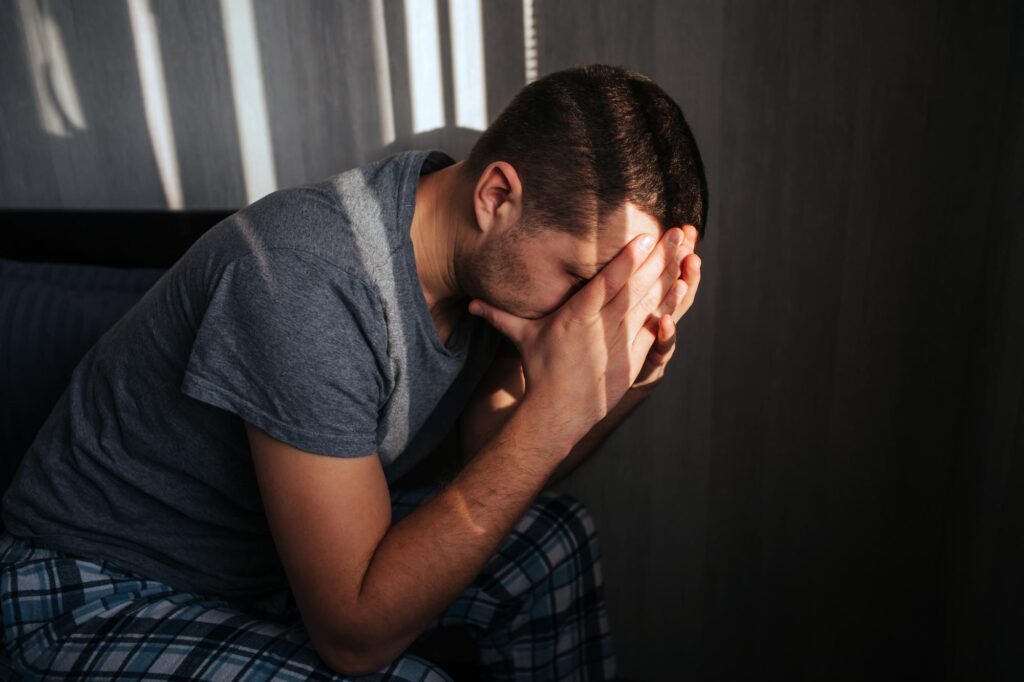Every June, Men’s Health Month, also known as Men’s Mental Health Month, shines a light on the specific challenges men face when it comes to mental and emotional wellbeing. While physical health is important, mental health remains one of the most under-addressed yet critical aspects of men’s overall wellness.
At Pacific Breeze Recovery, we believe that acknowledging and treating mental health is foundational to building a healthier, more resilient life. During Men’s Mental Health Month, we emphasize the importance of breaking down stigma and encouraging men to seek the support they need.
The Mental Health Crisis Among Men
Men’s mental health remains a critical but often overlooked public health issue. Studies from the American Psychological Association and the National Institute of Mental Health reveal that men face high rates of depression, anxiety, PTSD, and substance use disorders. However, many men do not seek professional help, with only about one in four reaching out for support. This silence is frequently due to social stigma and cultural pressures that discourage men from expressing vulnerability.
As we observe Men’s Mental Health Month, it is vital to highlight this gap in care because it has serious consequences. Men who avoid discussing or treating their mental health issues may experience worsening symptoms, increased risk of substance abuse, and higher suicide rates. Addressing this crisis requires shifting cultural attitudes and increasing awareness about the importance of emotional well-being for men.
Common Mental Health Conditions in Men

Men can experience a range of mental health disorders, though their symptoms sometimes present differently than in women. Understanding these conditions is essential for recognizing when to seek help.
Some of the most common conditions among men include:
- Depression: Often expressed through irritability, anger, emotional numbness, or withdrawal rather than sadness.
- Anxiety Disorders: May cause avoidance of stressors, restlessness, or physical symptoms such as heart palpitations.
- Post-Traumatic Stress Disorder (PTSD): Especially prevalent among veterans and trauma survivors, involving flashbacks, hypervigilance, and emotional numbing.
- Substance Use Disorders: Sometimes used as a way to self-medicate underlying mental health problems, complicating diagnosis and treatment.
Awareness of these patterns during Men’s Mental Health Month helps with early identification and intervention. Men’s unique ways of expressing distress underscore the need for tailored screening tools and treatment approaches that go beyond traditional symptom checklists.
Barriers That Prevent Men From Seeking Help
Societal expectations about masculinity create significant obstacles for men seeking mental health care. From a young age, boys often learn that showing emotion is a sign of weakness, making it difficult to openly discuss mental struggles.
Additional pressures such as the need to “man up,” maintain the role of provider, and avoid vulnerability further discourage many men from pursuing therapy. Cultural stigma and fears about confidentiality or appearing “less than” can also be major deterrents. These barriers are often compounded by practical issues like limited access to male-friendly services or culturally sensitive providers.
Changing these deep-rooted beliefs is essential. Encouraging open dialogue, normalizing therapy, and increasing availability of men-focused mental health resources can help break down these walls and make support more accessible.
Normalizing Mental Health Support for Men
Addressing the mental health crisis among men requires a fundamental cultural shift toward acceptance and openness. For too long, societal expectations have equated masculinity with toughness and emotional restraint, discouraging men from expressing vulnerability or seeking help. Changing this narrative begins with creating environments where vulnerability is not only accepted but honored as a sign of true strength.
Men’s Mental Health Month serves as an important annual reminder to create safe spaces where men feel comfortable sharing their feelings and struggles without fear of judgment or ridicule, opening the door for healing and connection.
One powerful way to foster this change is through peer support groups tailored specifically to men’s experiences. These groups provide a space where men can relate to others facing similar challenges, breaking down isolation and stigma. Additionally, therapeutic approaches that emphasize practical action, problem-solving, and skill-building often resonate more effectively with male clients, who may prefer structured, goal-oriented methods.
Sharing stories of men who have navigated their mental health journeys successfully also plays a vital role in shifting perceptions, especially when highlighted during Men’s Mental Health Month campaigns. These narratives inspire hope and encourage others to recognize that seeking help is a courageous step rather than a sign of weakness. At Pacific Breeze Recovery, we integrate evidence-based therapies like cognitive-behavioral therapy to empower men to take charge of their mental health, helping them build resilience and reclaim their well-being in a supportive and understanding setting.
Mental Health as Preventive Care
Mental health is a vital component of overall well-being and should be treated proactively. Left untreated, chronic stress, anxiety, and depression can increase the risk of physical health problems like heart disease and weaken the immune system.
During Men’s Mental Health Month, we emphasize the importance of adopting preventive habits such as regular self-reflection, journaling, setting healthy boundaries, and ensuring adequate rest to build emotional resilience. Recognizing early warning signs and addressing them before symptoms escalate helps maintain balance and improves long-term health outcomes.
The Link Between Mental Health and Lifestyle
A healthy lifestyle supports both physical and mental well-being. Regular physical activity helps reduce stress hormones and boosts mood-enhancing brain chemicals, making exercise a natural anxiety and depression reliever.
Even simple daily habits—such as walking outdoors, practicing mindfulness, or maintaining a balanced diet—can improve mental clarity and emotional stability. Establishing consistent routines fosters a sense of control and confidence, which in turn supports mental health recovery and maintenance.rd a healthier future. Contact Pacific Breeze Recovery today – your wellbeing is worth the investment.
How Pacific Breeze Recovery Supports Men’s Mental Health
Pacific Breeze Recovery provides specialized mental health programs tailored to address the unique challenges men often face. Our approach combines compassion, clinical expertise, and evidence-based therapies designed to meet men where they are emotionally and culturally. We understand that every man’s experience with mental health is different, which is why we create individualized treatment plans that honor personal history, identity, and preferences.
Our comprehensive care model includes a variety of therapeutic modalities proven effective in treating men’s mental health concerns, including:
- Cognitive Behavioral Therapy (CBT): Helps clients identify and change unhelpful thought patterns and behaviors.
- Dialectical Behavior Therapy (DBT): Focuses on emotional regulation, distress tolerance, and improving interpersonal relationships.
- Trauma-Informed Care: Recognizes the impact of past trauma and provides safe, supportive treatment to promote healing.
- Art Therapy: Uses creative expression to help men process emotions that may be difficult to verbalize.
- Mindfulness and Meditation Practices: Builds awareness and reduces stress through grounding techniques.
- Group Therapy for Men: Creates a supportive, stigma-free space for men to share experiences and build connection, reducing feelings of isolation.
- Individualized Treatment Plans: Tailored to each client’s cultural background, lifestyle, and personal goals to maximize effectiveness.
- Family and Couples Therapy: Involves loved ones in the healing process, promoting healthier communication and support systems.
- Holistic Wellness Integration: Combines mental health treatment with physical health, nutrition, and fitness programs to support whole-person healing.
At Pacific Breeze Recovery, our multidisciplinary team of licensed therapists, psychiatrists, and wellness specialists collaborates closely to provide integrated care that respects men’s diverse needs. This approach encourages sustainable recovery, emotional resilience, and long-term wellness. Contact us today to get starter.
Taking the First Step Toward Mental Wellness

Recognizing the need for mental health support is a courageous and vital first step. Men’s Mental Health Month serves as an important reminder that seeking help is a sign of strength, not weakness.
Starting the journey toward wellness can be as simple as reaching out for more information, asking questions, or scheduling a confidential consultation. At Pacific Breeze Recovery, we prioritize creating a safe and welcoming environment where men feel heard, understood, and empowered.
Our team is committed to guiding each individual through a personalized care path, offering:
- Respectful, nonjudgmental support from intake through recovery
- Access to proven, evidence-based treatment options
- Encouragement to build coping skills and emotional resilience
- Connection to a community of peers who share similar experiences
- Ongoing aftercare planning to maintain progress beyond treatment
Taking that first step unlocks the door to healing, renewed hope, and improved quality of life. Pacific Breeze Recovery stands ready to walk alongside men on this important path toward lasting mental health and well-being. Contact us today.
FAQs (Frequently Asked Questions)
What is Men’s Health Awareness Month and why is it observed every June?
Men’s Health Awareness Month is an annual observance held every June to raise awareness about the unique health challenges men face, including cancer, heart disease, and mental health issues. It serves as a call to action for better men’s wellbeing through education, early detection, and preventive care.
What are the common health risks affecting men that Men’s Health Awareness Month addresses?
The month highlights major chronic diseases prevalent among men such as prostate and colorectal cancers, cardiovascular risks like high blood pressure and cholesterol, as well as diabetes. It emphasizes the importance of managing these conditions proactively to reduce mortality rates.
Why is mental health a critical focus during Men’s Mental Health Month?
Mental health is crucial because men commonly face disorders like depression and anxiety but often encounter barriers in seeking help. Addressing mental wellness alongside physical health encourages open conversations and builds strong support systems to improve overall wellbeing.
What preventive healthcare measures are recommended for men during Men’s Health Awareness Month?
Recommended screenings include prostate exams, colonoscopies, blood pressure checks, cholesterol testing, and diabetes screening. These preventive measures help detect potential health issues early and reduce risk factors for chronic diseases.
How can adopting healthy lifestyle habits improve men’s wellbeing?
Consistent physical exercise tailored to men’s needs enhances cardiovascular fitness and muscle strength. Alongside balanced nutrition and stress management, these holistic habits contribute significantly to improved physical and mental health.
How does Pacific Breeze Recovery support men’s holistic wellbeing through their treatment programs?
Pacific Breeze Recovery offers comprehensive treatment programs that address both physical and mental aspects of men’s health. Their approach includes personalized support for managing chronic diseases and mental health challenges, promoting overall wellness during the men’s health journey.

